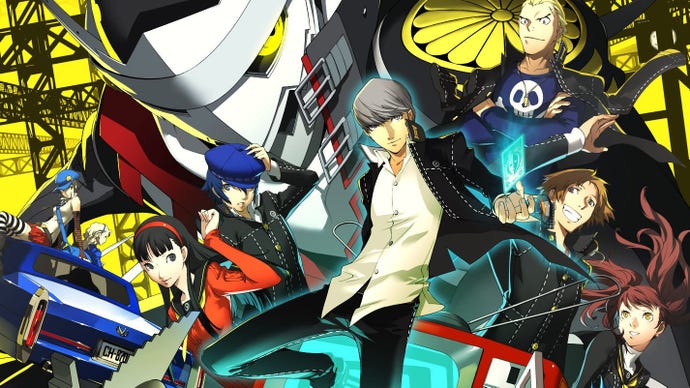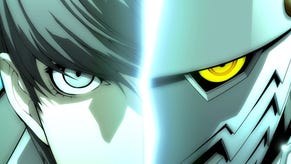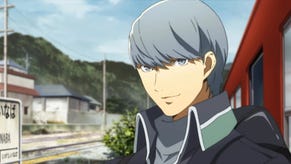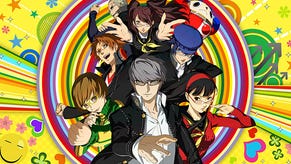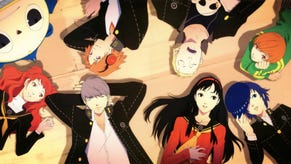The Top 25 RPGs of All Time #9: Persona 4
Persona 5 came close, but you can't change our hearts on this one.
This article first appeared on USgamer, a partner publication of VG247. Some content, such as this article, has been migrated to VG247 for posterity after USgamer's closure - but it has not been edited or further vetted by the VG247 team.
Putting together a list of the Top 25 RPGs of All Time (as dictated by the Blood God and inscribed dutifully by Kat and myself) isn't an easy task. But filling the #9 slot proved especially challenging because Kat and I knew the list's first single-digit belonged to a Persona game; we just weren't sure which one.
Kat and I attempted to confer with the Blood God, but the Blood God was taking an extended nap at the time. We rolled up our sleeves and narrowed our choices down to Persona 4 or Persona 5, then asked you good people to make the last call for us.
You answered. You made your opinions known. And known. And known. We have a verdict: The #9 slot on our Top 25 RPGs of All Time list goes to Persona 4. Specifically, Persona 4 Golden, a.k.a. the best and brightest reason to own a PS Vita (it's also now available on PC).
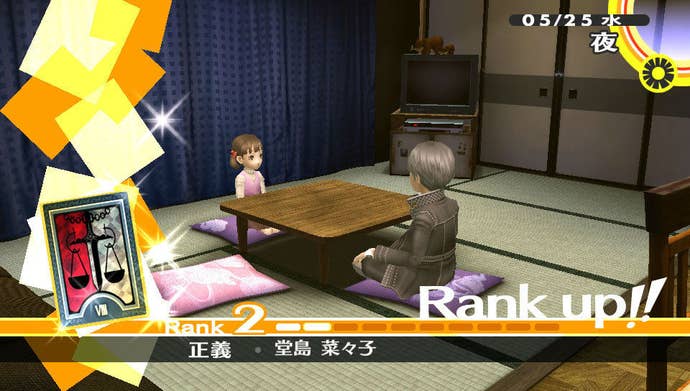
This isn't an easy call to make. As Kat and I note in our relevant Blood God episode—and as many of you note in the episode's comments—both Persona 4 and Persona 5 have strengths and weaknesses. Those strengths and weaknesses just happen to be in different categories. The general sentiment dictates Persona 5's style and gameplay easily vault up and over Persona 4's rather flat, randomly-generated dungeons, but Persona 4's setting, story, and characters are truly special.
Frankly, I concur. I played Persona 4 and 5 alongside each other, which was an interesting position to be in, and I still enjoyed my time with Persona 5 more than 4. That said, I admit Persona 4's cast and localization are more engaging than Persona 5's motley crew (much as I still adore Yusuke the Lobster King). When you're playing a 100+ hour RPG built around the bonds you form with your friends, you need a damn good reason to hang around with those friends after work, after school, or whenever they just need you.
I still believe Persona 5 has great characters, and the personal struggles of each character make them easy to sympathize with. All credit to Atlus, it's crystal-clear Persona 5 has a very different story to tell than Persona 4. Persona 5 starts with a paroled high school kid getting the living Jesus kicked out of him in an interrogation cell. If you fail to beat any the game's dungeons by the set deadline (as per Persona tradition), the consequences are extremely grim. In Persona 5's intro, Yusuke wields a paintbrush and literally splashes the game's message of rebellion and bucking authority on the screen. In case the message doesn't penetrate your eyeballs, the group's bad boy, Ryuji, barks it out more than once: "Don't trust any shitty adults."
Persona 4 lacks Persona 5's urgency, and believe it or not, that's to the former's benefit. Put simply, Persona 4's cast gets a chance to be kids, a luxury Persona 5's crew never enjoys. Persona 5's protagonist is on parole; he can't just stride up to anyone and make friends. He can't participate in after-school clubs. He initially can't leave his temporary home, the Montblac Coffee shop, during evening hours. Persona 5 has a lonely start, and making friends—all of whom are damaged, some severely—takes a while.
Compare that to Persona 4's opening moments. The protagonist, Yu (I only recently had the joke explained to me), is welcomed warmly to the laid-back Inaba countryside. Three of the main characters, Chie, Yosuke, and Yukiko, already know each other well, and happily invite Yu to hang out. While that might sound unattractive on paper, the gristly murders at the center of Persona 4's plot keep the characters' relationships from delving into saccharine shonen anime territory. One day it's all fun and games while Chie screams "TRIAL OF THE DRAGOOOON" at Yosuke; the next day, some poor bastard's hanging upside-down from a TV antenna.
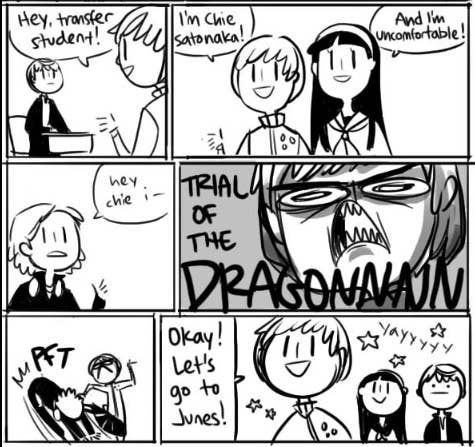
And, like all good murder mysteries, Persona 4 encourages you to side-eye every character you meet and question their motivations. Even Yu comes under suspicion. His guardian, Detective Dojima, can't help but notice the murders didn't begin until he took in his quiet nephew. While most games would be satisfied to jerk a thumb at a character like Dojima and say, "Get a load of this guy, what a gullible idiot, right?" Dojima is anything but, though. It's initially easy to dislike the detective for suspecting you miiight be a murderer (to say nothing of how he lets a Japanese Wal-Mart commercial babysit his tiny vulnerable daughter), but when you find out his wife was hit by a car and left to die on a cold street, you say to yourself "Well, there's a rumor going around that nobody's perfect."
The rest of the cast's imperfections help draw you closer to them, too. While their struggles with jealousy, resentment, sexual identity, and gender roles don't offer as many clear-cut "Boom! Drama!" moments as Persona 5's war against corruption, they're relatable on a painful level—especially for younger players still wondering about their own sexuality or struggling with body image issues. Even Yosuke learning his crush despises him for his parents' role in chasing small retail out of Inaba is heart-breaking: The infiltration of Junes is an event Yosuke has no control over, but it's also something said crush, Saki, has the right to feel resentful about.
(A small diversion: On previous episodes of Blood God, Kat and I criticized Yosuke's [frankly gross] reaction to Kanji's own struggle with his orientation, and I seriously wish Persona 4 had tackled the issue better. According to rumor, Yosuke was originally supposed to be datable; a "coming out" story arc examining his bisexuality and dealing with his internalized homophobia would have been far preferable to making Kanji's love for needlework an endless gay joke.)
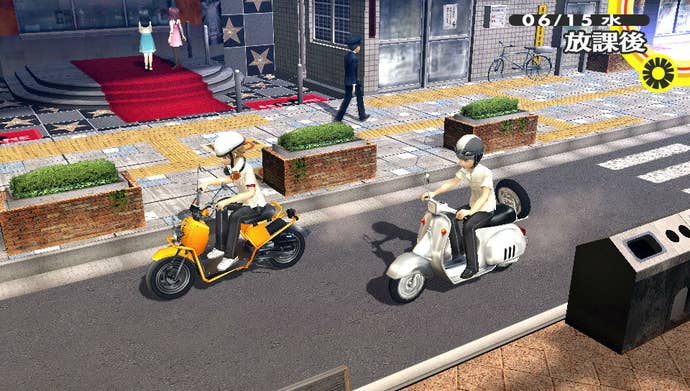
Persona 4's decision to take things a little slower and give you a chance to really get to know the characters of Inaba also makes the reveal of its final villain chilling. Sadly, Persona 5 doesn't string you along convincingly, though it still seems to want to shock you with its Big Twist. Again, Persona 5's brighter lights, louder music, and swarming city streets work against it here. I love Persona 5's final Palace, its music, and the fact you get to explore big parts of it as mice wearing masks, but its big sweeping climax about corrupt politicians and insane bastard children doesn't unsettle me half as much as Persona 4's comparatively low-key reveal. Persona 5's shitty adults are consistent in their shittiness, but Persona 4's villain throws up a goofy, friendly façade around a black, cold soul that seethes with entitlement and misogyny. "At the end of the day," Persona 4 tells us, "You don't really know what anyone stores in the deepest, darkest part of themselves." That's terrifying. And it's true.
It's also why Persona 4 emphasizes the bond between lifelong friends above everything else. Building a strong network of friends and performing the simple acts of kindness that strengthen those bonds are small but significant things we can do to help us power through dark times. We can't eliminate the shadows that follow us—nor should we, they're as much a part of us as our hearts and souls—but our friends can watch our backs and help us rein the shadows in when it looks like we might lose control. Persona 5's message to "question everything" is good advice during these heavy, grey days but Persona 4's "Count on your friends" has a place, too.
